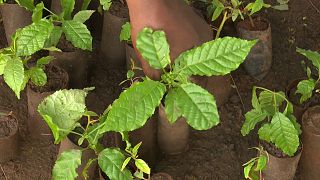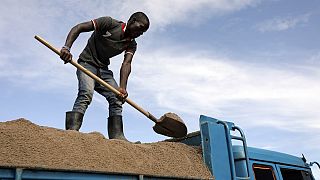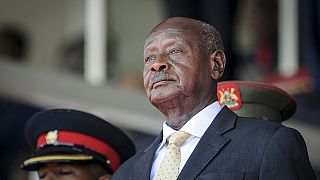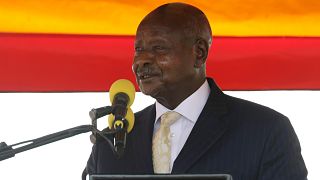Uganda
Uganda has long struggled to protect its forests, amid a population explosion that fuels demand for plant-based energy sources perceived as cheap, especially charcoal.
According to a 2018 report by the U.N. Food and Agriculture Organization, reliance on charcoal or firewood is highest in Africa and Asia, with some African cities almost entirely dependent on charcoal for cooking.
Some 25% to 35% of climate-changing greenhouse gas emissions come from so-called biomass burning, which also includes seasonal fires intentionally set to clear land for agriculture, according to the European Space Agency.
Most of those fires occur in tropical regions of Africa. In Uganda, an East African country of 45 million people, charcoal is preferred in households across the income spectrum, but especially in those of the urban poor — seen as ideal in the preparation of certain dishes that require slow cooking.
Middle-class families maintain both gas cookers and charcoal stoves.
The leading supplier of charcoal in the country, northern Uganda, has long been the scene of sustained forest destruction, with local leaders demanding a total ban on commercial production.
Uganda's President Yoweri Museveni recently issued an executive order banning the commercial production of charcoal in the area, disrupting a national trade that has long been influenced by cultural sensibilities as much as the seeming abundance of idle land.
It remains to be seen how effective the president’s order will be amid corruption concerns and an inevitable scarcity that's bound to make charcoal more expensive.
Charcoal production persists despite the presidential order, as well as an anti-climate change law empowering local authorities to regulate harmful activities.
Days after Museveni’s order, the charcoal-burning enclave in a remote part of Gulu is still active.
A small area of bamboo opens up to an almost bare patch in which trees have been cut, juicy stumps still fresh here and there.
The official, Patiko Sub-County Chairman Patrick Komakech, is agitated and on the verge of tears.
Timber has been heaped like contraband ivory in different spots, and gray smoke rises from one pile being processed.
Besides it stands loaded bags of charcoal. The charcoal makers slept in little tarp tents draped in dry leaves.
"These people are destroying this environment," says Komakech. "They are not the Indigenous of this place, they are people who are actually imported and put in this community. And they do this thing without the mercy of leaving any vegetation, as you can see."
He thinks the felled logs are from the African Shea tree, a plant prized by the region’s Acholi people for its tasty fruit as well as the cosmetic oil it gives.
The felling of the Shea tree was one reason cited by the president in banning commercial production of charcoal there.
But the men who do this job say they are simply earning a living.
One asserts that charcoal from northern Uganda is likely used even in the State House.
Some charge that they are cutting the trees with the complicity of landlords, who sell charcoal-making rights by the acre to interested dealers.
“Even those policemen who are coming to beat us, they are cooking with charcoal,” says charcoal burner Peter Ejal.
“We are not here to spoil the environment. We are here by their orders, those people who are selling these trees."
An acre of property with plenty of trees goes for up to $150 in Gulu, although the sum can be much smaller in remote but vegetation-rich ranches owned by the poorest families.
The investors then deploy men armed with power saws and machetes, working over specific areas and leaving when they have cut down all the trees they were sold.
The scene can appear incongruously denuded of tree cover when the men are done, left with saplings and shrubs.
Trucks are driven into the bush to take the charcoal away.
“We are not going to stop,” says Deo Ssenyimba, a ragtag charcoal maker, who's been active in northern Uganda for 12 years.
“We stop and then we do what? Are we going to steal?”
Ssenyimba says he’s paid about $3 for every bag of charcoal he makes.
In nearby towns, a bag fetches about $14, but the price rises further as the goods approach Kampala, the capital.
Some local activists have formed vigilante groups in districts such as Gulu, where a former lawmaker recently led an attack on a truck that was dispossessed of 380 bags of charcoal.
Although Odonga Otto has since been charged with aggravated robbery, the country’s chief justice has praised the suspect as a hero.
“We decided to make central Uganda lose appetite for Acholi charcoal, this is now where my politics came in. I mobilized all the youths in the region to stop any truck carrying charcoal," says former lawmaker Odonga Otto.
District councils in the region raise revenue from licensing and taxes, and some security officials have backed truckers with armed security, according to Museveni and Otto.
Otto has helped impound multiple trucks in recent weeks, including two recently seized ones parked outside a police station where a crowd gathered one recent afternoon, hoping to grab the goods.
Otto says he plans to serve hundreds of local officials with letters of intent to sue for any lapses in protecting the environment.
He says his goal is to make the rest of Uganda “lose appetite” for charcoal from his region.
“We managed to make the business risky. As of now, you drive a hundred kilometers, and you will not find any single truck carrying charcoal," he says.











01:00
Pix of the Day: July 3, 2025
01:22
World will have to learn to live with heatwaves, UN says
Go to video
Morocco: United Kingdom withdraws from renewable energy project
01:45
From Uganda to NYC: Zohran Mamdani's rise in American politics
01:22
Ugandan-born Zohran Mamdani declares victory in New York Democratic mayoral primary
00:24
Greenland and Iceland saw record heat in May